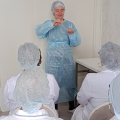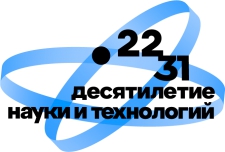Conference "SCIENTIFIC PROVISION OF ANTI-EPIDEMIC PROTECTION OF THE POPULATION: ACTUAL PROBLEMS AND SOLUTIONS"
RESULTS OF RUSSIAN CONFERENCE "SCIENTIFIC PROVISION OF ANTI-EPIDEMIC PROTECTION OF THE POPULATION: ACTUAL PROBLEMS AND SOLUTIONS"
Nizhny Novgorod, 11-12 september 2019
The conference was attended in person by 205 specialists from organizations of Rospotrebnadzor, medical organizations, higher education institutions of the Ministry of Health of Russia and other organizations from 57 administrative units and 2 cities (Moscow, St. Petersburg) of Russia and the Republic of Kazakhstan. Within the framework of the conference, 6 meetings were held in all the main scientific areas declared for discussion, at which 52 reports were heard, 10 reports were presented in the format of a poster session. The conference as a whole was of a multidisciplinary nature, which was reflected in the subject of reports.
The conference stated the following:
- the system of sanitary and epidemiological surveillance of bacterial and viral infections is in demand and effective in solving problems in the field of social policy, reducing morbidity and mortality from infectious diseases, population policy, and state security;
- the emergence of new biogenic threats of bacterial and viral etiology require the improvement of measures and methods to combat infectious diseases;
- improvement of infection control methods should be aimed at substantiating a set of measures for their identification, prevention and consistent reduction;
- a qualitatively new level of diagnosis and prevention of infections involves the introduction into practice of cellular, genomic and postgenomic technologies, the principles of personalized medicine;
- the issues of studying new pathogens, a deeper study of the mechanism of development of combined infections are relevant, new tasks are being set in the field of containing the rapidly growing antimicrobial resistance of known pathogens;
- the most important practical tasks are the development of new domestic antibacterial and antiviral agents, combined vaccines, immunobiological preparations, preparations of bacteriophages, and disinfectants.
The Conference decided:
- to promote the implementation in practice of the work of bodies and institutions of Rospotrebnadzor and medical organizations of a risk-based approach to the prevention of infections of bacterial and viral etiology;
- to promote scientific research on the isolation and study of antigenic and genetic determinants of circulating respiratory viruses, epidemiological and virological studies of causative agents of uncontrolled respiratory tract infections (rhinoviruses, adenoviruses, etc.);
- step up work on optimizing the monitoring of intestinal virus circulation using modern methods of indication and identification;
- expand activities to study new recombinant forms of HIV that are resistant to antiretroviral therapy, increase attention to the problem of the active use of phylogenetic analysis in the investigation of HIV infections;
- to contribute to the improvement of the activity of reference scientific, practical and scientific and methodological centers of Rospotrebnadzor in the direction of monitoring and forecasting the incidence rate taking into account the epidemiological situation, to update the development and active use of mathematical modeling methods and GIS technologies;
- develop new strategies and tactics for specific and non-specific infection prevention, including through vaccination against chickenpox, meningococcal, rotavirus, papillomavirus infections;
- actively contribute to the improvement of measures for the control and prevention of infections associated with the provision of medical care;
- to intensify research in the direction of the implementation of the "Strategy for preventing the spread of antimicrobial resistance in the Russian Federation for the period until 2030";
- continue research work aimed at studying the genes that determine the resistance of microorganisms, resistance markers;
- to promote the introduction of new high-tech technologies, including methods of genetic engineering, structural and functional genomics and proteomics, recombinant biotechnologies;
- to expand scientific research to study the possibility of using cell cultures in the field of biotechnology and virology, to develop new methods for indicating pathogens using biosensors based on cell technologies;
- continue to improve the system of microbiological and virological monitoring, including through the development of interaction between federal and regional government bodies, local authorities and other interested structures, filling and further updating the databases of the monitoring system and state statistics, the integration of information systems and databases of member states Eurasian Economic Commission;
- contribute to the expansion of scientific exchange of information with domestic and foreign colleagues on the identification of biological agents, assessment and characterization of health risks, improving the effectiveness of sanitary and epidemiological surveillance and safety.
In general, the participants noted the scientific and practical significance and relevance of the materials presented at the conference, the high level of professionalism of the speakers, a clear and high-quality organization of the conference.





